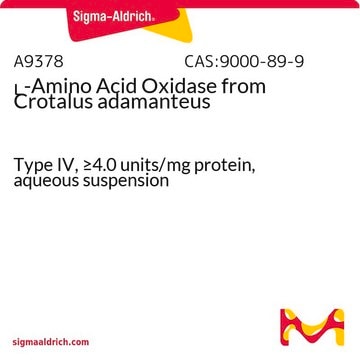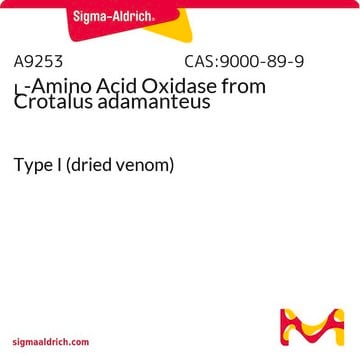F7296
Fructosyl-Amino Acid Oxidase from Corynebacterium sp.
recombinant, expressed in E. coli, lyophilized powder, ≥0.45 units/mg protein
Sign Into View Organizational & Contract Pricing
All Photos(1)
About This Item
Enzyme Commission number:
1.5.3.x
EC Number:
MDL number:
UNSPSC Code:
12352204
NACRES:
NA.54
Recommended Products
recombinant
expressed in E. coli
Quality Level
form
lyophilized powder
specific activity
≥0.45 units/mg protein
mol wt
~88 kDa by electrophoresis
storage temp.
−20°C
General description
Fructosyl amino acid oxidase [fructosyl-a-l-amino acid:oxygen oxidoreductase] is a flavoprotein that catalyzes the oxidation of fructosyl amino acids to form glucosone, amino acid and hydrogen peroxide.
Enzyme Commission (E.C.) 1.5.3.x
Application
Fructosyl-Amino Acid Oxidase from Corynebacterium sp has been used in glycated haemoglobin HbA1c detection in blood samples using quartz crystal microbalance (QCM) based detection.
Fructosyl-amino acid oxidase can be used to detect the levels of glycated proteins, which are markers for diabetes mellitus.
Biochem/physiol Actions
Fructosamines are formed when glucose is condensed amino group of amino acids or proteins. Fructosamine oxidases (FAOX) catalyze the oxidative deglycation of low molecular weight fructosamines. Fructosyl amino acid oxidase catalyzes the oxidation of the C-N bond linking the C1 of the fructosyl moiety and the nitrogen of the amino group of fructosyl amino acids.
Fructosyl-Amino Acid Oxidase (FAOD) comprises of FAD-binding motifs and is classified into three types based on substrate specificity. The engineered Corynebacterium Fructosyl-Amino Acid Oxidase is stable at 45°C and could be exploited for the development of glycated protein biosensing system and glycated hemoglobin HbA1c measurements. FAOD shares sequence homology with fructosyl peptide oxidase and both are effective on α-fructosyl substrates.
Suitable for the determination of fructosyl-L-amino acid.
Unit Definition
One unit will produce 1.0 μmole of hydrogen peroxide per minute at pH 8.0 at 37 °C.
Storage Class Code
11 - Combustible Solids
WGK
WGK 3
Flash Point(F)
Not applicable
Flash Point(C)
Not applicable
Personal Protective Equipment
dust mask type N95 (US), Eyeshields, Gloves
Choose from one of the most recent versions:
Already Own This Product?
Find documentation for the products that you have recently purchased in the Document Library.
Customers Also Viewed
C Gerhardinger et al.
The Journal of biological chemistry, 270(1), 218-224 (1995-01-06)
A Pseudomonas sp. soil strain, selected for its ability to grow on epsilon-(1-deoxyfructosyl) aminocaproic acid, was induced to express a membrane-bound enzymatic activity which oxidatively degrades Amadori products into free fructosamine. Apparent Km values for fructosyl aminocaproate, epsilon-fructosyl lysine, fructosyl
R Romero Campos et al.
Angiologia, 43(3), 130-131 (1991-05-01)
Authors report the case of a young man affected by an aneurysm at the humeral artery. The relevance of this case was due to its notable rare incidence at such level as well as its difficult etiologic diagnosis. Patient was
A quartz crystal microbalance-based biosensor for enzymatic detection of hemoglobin A1c in whole blood
Park HJ and Lee SS
Sensors and Actuators B, Chemical, 258, 836-840 (2018)
Structural basis of the substrate specificity of the FPOD/FAOD family revealed by fructosyl peptide oxidase from Eupenicillium terrenum
Gan W, et al.
Acta Crystallographica. Section F, Structural Biology Communications, 71(4), 381-387 (2015)
S A Schellini et al.
Acta ophthalmologica, 67(5), 601-604 (1989-10-01)
The authors report a case of fibrohistiocytoma of the limbus and discuss the clinical, histopathological and immunohistochemical findings concerning this type of lesion, with a comparison of their findings with those reported in the literature.
Our team of scientists has experience in all areas of research including Life Science, Material Science, Chemical Synthesis, Chromatography, Analytical and many others.
Contact Technical Service










